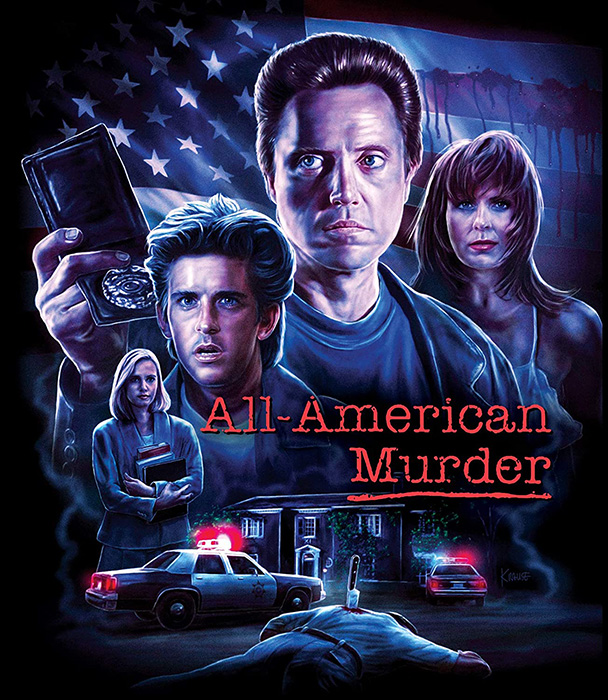After his college roommates set his pet snake on fire, known rebel and all-around badboy -Artie Logan (Charlie Schlatter) is accused of arson and ends up in jail. After bailing him out, his a-hole dad pulls some strings and somehow gets Artie enrolled in a prestigious college. He’s on campus exactly 5 minutes before getting distracted from his studies by sleeping with the dean’s wife and then falling head over heels in love with the gorgeous Tally (Josie Bissett), a straight A sorority girl and cheerleader. Just as their unlikely romance is blossoming, Tally is burned to death right before Artie’s eyes by an unseen attacker. Now accused of her murder, Artie is given 24 hours to prove his innocence by the eccentric Detective Decker (Christopher Walken).
If you’re looking for a prime example of a film where the sum of the whole does not make its exposed parts not dangle in the wind on a cold day -I think that’s how the saying goes- then look no further than All-American Murder. This slasher comedy drama plus erotic thriller is one of the strangest films I’ve seen in quite a while. I love how this doesn’t know what kind of film it wants to be, but I suspect that it will frustrate some viewers. Every time All-American Murder hits its stride, it gets sideswiped by another oddball subplot or quirky diversion.
I was very surprised to see that there was only one screenwriter on this thing with how awkward everything is. When the plot gets serious, it’s very serious and when it gets funny, it is indeed funny. The biggest problem for me is that that the dialogue is too snappy at times with so many one-liners flying out of characters’ mouths that it doesn’t feel like people are even talking to each other. The worst bits for me are the edgy and wannabe hip interrogation scenes between Schlatter and Walken. The actors are clearly having a great time at the expense of the audience’s time and sanity. Maybe you’ll dig it, but I was climbing the dang walls.
The music score by Rod Slane, the composer on the sort of not really a classic Blood Cult (1985) and the mostly forgotten Forever Evil (1987), just feels off most of the time, though oddly fitting considering the tonal whiplash of the film. But I cherish his score when compared to the faux Christopher Cross songs unceremoniously shoved into the soundtrack at awful times. I know I’m biased here because of my love of 1980s music, but I always feel like early 90s films were bending over backwards to try to and separate themselves from the previous decade by making some awful choices of songs for their soundtracks.
Director Anson Williams certainly doesn’t let the inimitable Christopher Walken go to waste here as he’s given ample time to chew up the scenery in his wonderful, wacky way. And that might be one of the issues with All-American Murder. It feels like a completely different film when Walken isn’t onscreen. The bits where Schlatter is running around and attempting to solve the case against him are great but his periodic check-ins with Walken (who acts like his deranged parole officer) are just too different from everything else to feel cohesive.
Despite how much I’m harshing on All-American Murder, I did enjoy it and absolutely recommend folks check it out. It’s got something for everyone and no one in the best and worst way. And besides, any movie directed by Potsie Weber that features Richard Kind as a tough talking detective and Joanna Cassidy as the dean’s horny wife giving a bittersweet monologue is worth a look.
Despite some very minor print damage that you’ll have to squint to even see, All-American Murder looks amazing. The mix on some of those awful songs I mention is pretty dicey in a couple of spots but otherwise the film sounds great. There’s yet another awesome commentary by the always entertaining The Hysteria Continues! podcast and a pair of great interviews on the disc as well. First up, Charlie Schlatter discusses how he landed the role and what it’s like to work with Walken. He’s a funny and engaging guy and his insights added a lot to my enjoyment of the film after the fact. Then cinematographer Geoffrey Schaaf gives a fascinating interview on director Williams’s style and some more behind-the-scenes tidbits. My favorite part is how Williams trusted Schaaf so much that he gave him the opportunity to do all the storyboarding for the film himself.

